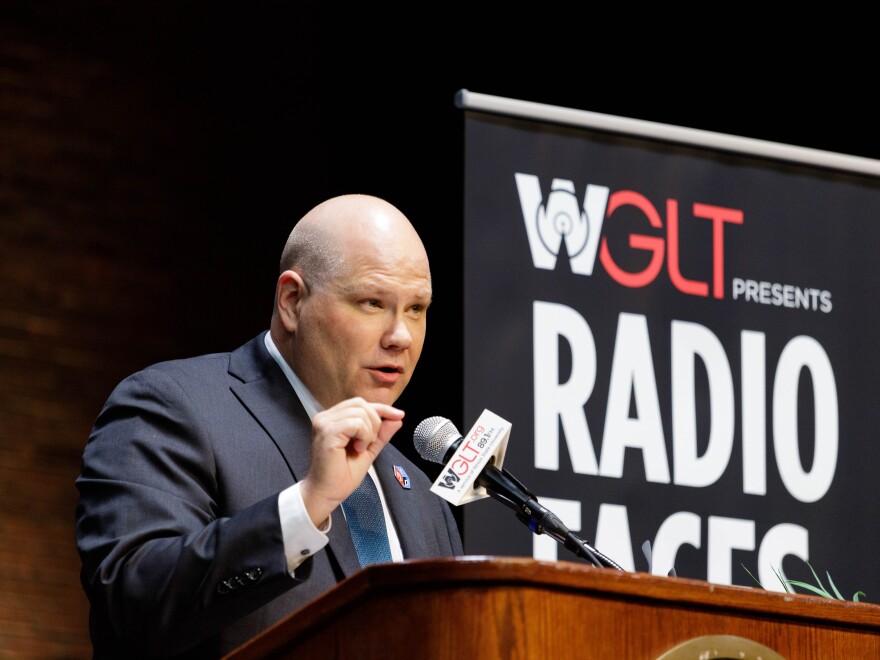WGLT and public broadcasters across the country are assessing an uncertain future after Congress voted after midnight Friday to cancel about $1.1 billion in funding already committed to public radio and television stations.
It was part of a Rescission Bill that also strips $7.9 billion from international aid programs. An amended version passed the House in a 216-213 vote along party lines. The Senate passed the bill in a 51-48 vote on Tuesday.
The rescission will cost WGLT about $175,000 per year in annual federal funding. WCBU, the NPR affiliate in Peoria which is operated by WGLT, will lose out on $125,000 in annual funding.

“For a station like WGLT, losing this federal funding wipes out a lot of the progress we have made over the last several years as a local journalism entity in this community,” WGLT Executive Director and NPR board member R.C. McBride said on WGLT's Sound Ideas.
Assistant Executive Director and Development Director Melissa Libert said the cut, which represents about 10% of WGLT’s annual budget, means the station will be unable to fill open reporter positions.

“It’s incredibly frustrating to watch jobs evaporate and to see young people leave journalism. It’s one of the hardest parts of the job since I’ve been here,” Libert said.
Libert said WGLT will look to recoup through community support at least a portion of the annual funding that Congress has taken back, adding that local contributions account for over half of WGLT’s budget.
“I think there is room to expand that [community support]," Libert said. "I just don’t think it’s realistic that we can fill the entire $175,000 gap."
Public radio stations in Illinois have requested additional funding from the state of Illinois. A legislative proposal from state Sen. Dave Koehler, D-Peoria, would provide an additional $12 million for public radio and television stations through the Illinois Arts Council.
The proposal introduced in January did not get a hearing during the last legislative session. The state’s $55 billion budget which Gov. JB Pritzker signed into law last month includes a $100 million “emergency fund” that gives the governor discretion to address funding issues caused by federal policy changes.
“That prospect exists — we continue to work on it — but the state of Illinois has a lot of gaps to fill in this environment,” McBride said.
The funding that’s being cut comes from the Corporation for Public Broadcasting [CPB], a nonprofit that funds local television and radio stations.
McBride said the funding cut will create ripple effects through the industry over the next few weeks and months. He said while Congress’ move to claw back funding is disappointing, it’s not surprising.
“In a way it’s a relief that it’s finally over because now we have clarity and we can chart a path forward, which we absolutely plan to do,” McBride said.
Public television
WTVP, the PBS station that serves the Bloomington-Normal and Peoria markets, expects to lose about $1 million annually from the recission and said CPB typically makes up about 30% of its annual budget.
“We are not feeling sorry for ourselves today. We are grateful to this community — and fully believe that what we provide is worthy of support whether it comes from the federal government or from members and donors,” said WTVP board chair John Wieland. “With the community’s support, we believe this will be a shining moment.”
How they voted
Republicans pushed the bill as a way to cut government spending, while some in the party made claims of political bias.
U.S. Rep. Darin LaHood, R-Dunlap, called the bill an example of good stewardship of taxpayer dollars.

"The American people gave Republicans a mandate to eliminate waste, fraud, and abuse in the federal government,” LaHood said in a statement.
LaHood emphasized the bill does not cut funding CPB funding for 2025. That funding is for the budget year that ends Oct. 1.
“I understand the vital role public broadcasting plays in our communities, especially in rural areas. I will continue to advocate for its funding during future annual appropriations processes,” LaHood said.
U.S. Rep. Eric Sorensen, D-Moline, calls the funding cancellation “outrageous” and said he fears it won’t be the last time the Trump administration moves to undo what Congress has authorized.
Sorensen said the move was entirely political and could be a “nail in the coffin” for broadcast outlets in smaller markets.
“This is an absolute political assault on public media,” Sorensen said.



